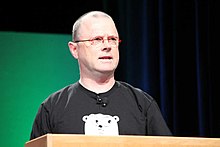Rob Pike
Jump to navigation
Jump to search

Rob Pike (born 1956) is a Canadian software engineer and author, best known for his work at Bell Labs and contribution in the creation of the Plan 9 from Bell Labs, the Inferno operating systems, the Limbo programming language, and the Go programming language.
| This article about an engineer, inventor or industrial designer is a stub. You can help Wikiquote by expanding it. |
Quotes[edit]
- Eventually, I decided that thinking was not getting me very far and it was time to try building.
- Rob Pike (1987). "The Text Editor sam".
- Where will we be ten years from now? CRT’s will be a thing of the past, multimedia will no longer be a buzzword, pen-based and voice input will be everywhere, and university students will still be editing with emacs. Pens and touchscreens are too low-bandwidth for real interaction; voice will probably also turn out to be inadequate. (Anyway, who would want to work in an environment surrounded by people talking to their computers?) Mice are sure to be with us a while longer, so we should learn how to use them well.
- Rob Pike (1991). "A Minimalist Global User Interface". Proc. Summer 1991 USENIX Conference, pp. 267–279.
- Object-oriented design is the roman numerals of computing.
- Rob Pike (2004) comment in comp.os.plan9 group at groups.google.com, 02-03-04
- On a related topic, let me say that I'm not much of a fan of object-oriented design. I've seen some beautiful stuff done with OO, and I've even done some OO stuff myself, but it's just one way to approach a problem. For some problems, it's an ideal way; for others, it's not such a good fit. [...] OO is great for problems where an interface applies naturally to a wide range of types, not so good for managing polymorphism (the machinations to get collections into OO languages are astounding to watch and can be hellish to work with), and remarkably ill-suited for network computing. That's why I reserve the right to match the language to the problem, and even - often - to coordinate software written in several languages towards solving a single problem. It's that last point - different languages for different subproblems - that sometimes seems lost to the OO crowd.
- Rob Pike (2004) in interview at slashdot.com, Oct 18 2004
- Those days are dead and gone and the eulogy was delivered by Perl.
- Rob Pike (2004) in interview at slashdot.com, Oct 18 2004
- I started keeping a list of these annoyances but it got too long and depressing so I just learned to live with them again. We really are using a 1970s era operating system well past its sell-by date. We get a lot done, and we have fun, but let's face it, the fundamental design of Unix is older than many of the readers of Slashdot, while lots of different, great ideas about computing and networks have been developed in the last 30 years. Using Unix is the computing equivalent of listening only to music by David Cassidy.
- Rob Pike (2004) in interview at slashdot.com, Oct 18 2004
- The major things we saw wrong with Unix when we started talking about what would become Plan 9, back around 1985, all stemmed from the appearance of a network. As a stand-alone system, Unix was pretty good. But when you networked Unix machines together, you got a network of stand-alone systems instead of a seamless, integrated networked system. Instead of one big file system, one user community, one secure setup uniting your network of machines, you had a hodgepodge of workarounds to Unix's fundamental design decision that each machine is self-sufficient.
- Rob Pike (2004) in interview at slashdot.com, Oct 18 2004
- One odd detail that I think was vital to how the group functioned was a result of the first Unix being run on a clunky minicomputer with terminals in the machine room. People working on the system congregated in the room - to use the computer, you pretty much had to be there. (This idea didn't seem odd back then; it was a natural evolution of the old hour-at-a-time way of booking machines like the IBM 7090.) The folks liked working that way, so when the machine was moved to a different room from the terminals, even when it was possible to connect from your private office, there was still a "Unix room" with a bunch of terminals where people would congregate, code, design, and just hang out. (The coffee machine was there too.)
- Rob Pike (2004) in interview at slashdot.com, Oct 18 2004
- The Unix room still exists, and it may be the greatest cultural reason for the success of Unix as a technology. More groups could profit from its lesson, but it's really hard to add a Unix-room-like space to an existing organization. You need the culture to encourage people not to hide in their offices, you need a way of using systems that makes a public machine a viable place to work - typically by storing the data somewhere other than the "desktop" - and you need people like Ken and Dennis (and Brian Kernighan and Doug McIlroy and Mike Lesk and Stu Feldman and Greg Chesson and ...) hanging out in the room, but if you can make it work, it's magical. When I first started at the Labs, I spent most of my time in the Unix room. The buzz was palpable; the education unparalleled.
- Rob Pike (2004) in interview at slashdot.com, Oct 18 2004
- Syntax highlighting is juvenile. When I was a child, I was taught arithmetic using colored rods. I grew up and today I use monochromatic numerals.
- Rob Pike (2012) in golang-nuts group at groups.google.com, Oct 28 2012

